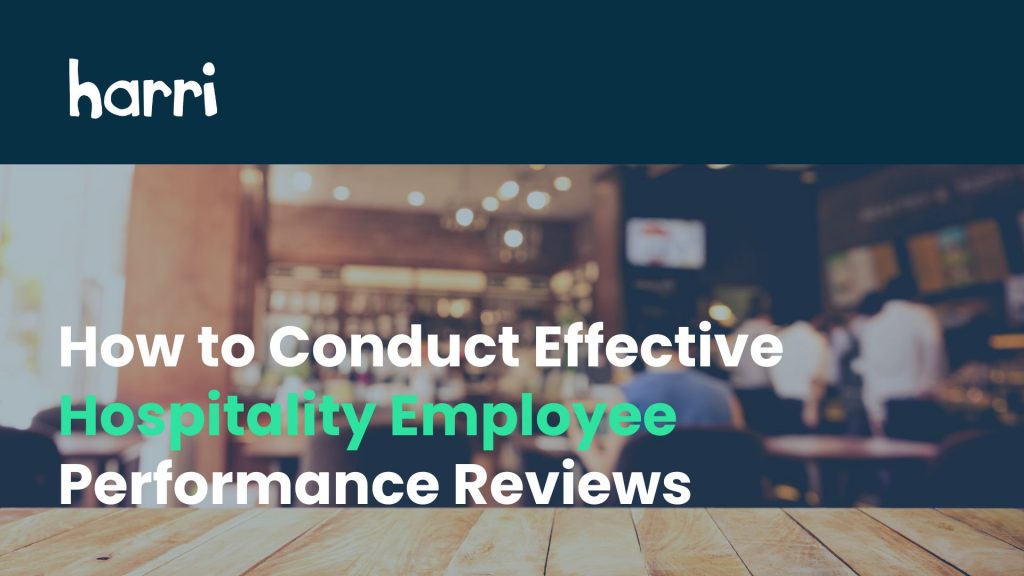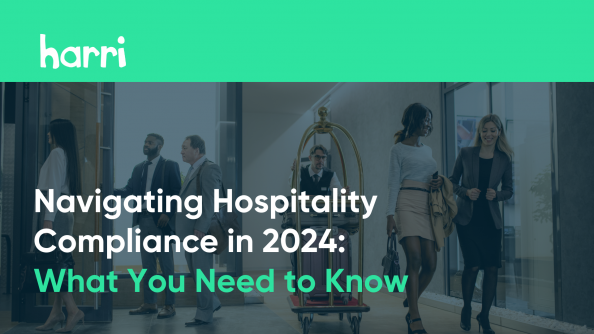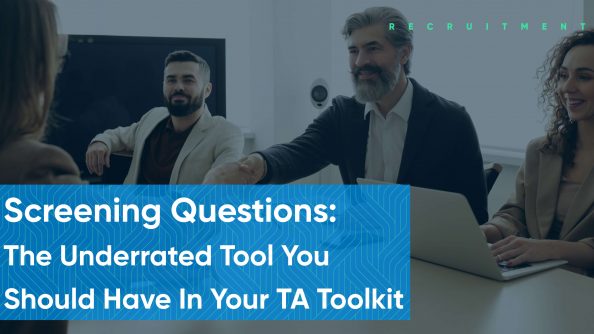Conducting Effective Employee Performance Reviews in the Hospitality Industry

- By Harri Insider Team | May 2, 2023
Employee performance reviews are key to keeping your staff. In the hospitality sector, such reviews can be as effective as raises in keeping team members. They’re not just formalities; they’re a genuine way to show gratitude and recognize the hard work of employees. Even brief reviews that offer constructive feedback show you value and respect your team, enhancing job satisfaction.
Hospitality workers face unique challenges, like handling tough customers and maintaining composure under pressure. That’s why it’s crucial for managers to approach these reviews with care, ensuring they truly reflect the employee’s efforts and the distinctive demands of the industry. For more insights, check out Harri’s Online Resources.

How Managers Can Prepare for Performance Reviews
Hospitality industry managers can do their part to prepare for productive performance reviews by planning those evaluations well ahead of time. The employee performance review preparation work is just as important as the actual review and follow-up in the months ahead. Managers should develop a system for gathering data along with employee feedback, establish transparent expectations for employee performance, and adhere to the promised review schedule moving forward.
Above all, clarity matters most. The evaluation system for employee performance should be simple and be part of a more significant employee communication strategy.
Taking full advantage of Harri’s communications, feedback, and announcements capabilities to engage a team regularly and conduct employee reviews will be much more accessible and productive. Our full suite of features includes all sorts of helpful capabilities, including:
- The sending of alerts, including timely push alerts
- Collecting feedback from employees
- Uploading of media
- Communication through messages and surveys
- And much more
The nuances of your employee performance reviews should be specific to the hospitality industry. While online templates are a great start, choose to develop your performance reviews tailored to the hospitality industry and your niche.
Align the evaluation with the business’s aims to give contributors a better sense of how their performance is progressing. This will provide employees with the information they need to move forward constructively.
In summary, your employee performance appraisal system should be distinct from your organization’s needs and goals. However, there are overarching thematic components of all hospitality industry employee reviews, including identification of employee flaws and strengths, gauging ongoing success (or lack thereof), and managing employees for mutual benefit.
Conducting Employee Performance Reviews: Tips and Best Practices
Employee reviews have the potential to be dramatic or even become more personal than professional. Recognize the potentially combustive nature of such annual or biannual events and move forward with tact and cordiality. The bottom line is some employees are highly sensitive and temperamental. Instead of listing one complaint after another, deliver the review through constructive criticism, allowing employees to build on their underperformance.
The subtleties of the performance review context are of great importance. Conducting an employee review on Monday morning after a holiday break is not prudent. Schedule employee reviews for Thursdays or Fridays between major holidays and scheduled vacations. Reviews should occur toward the end of the workday so the discussion and written evaluation do not hinder employee performance.
The most effective employee performance reviews are dialogues instead of authoritative monologues. Though you, the business owner or manager, will provide most of the feedback during the review, there is room for rebuttals and discourse. Give employees a chance to respond to criticism and provide their feedback.
It also makes sense for the employee to conduct a self-review. Ideally, employees will be provided with the opportunity to perform a written self-evaluation prior to the formal performance review, setting the stage for comparing those two analyses. Give the employee some time to read through your written evaluation and self-reflect. Then, the employee and employer responses will be contrasted for mutual benefit.
The moral of the story is the best hospitality industry employee performance reviews are characterized by reciprocity. Employers should be willing to give feedback and also accept suggestions from employees. Empower your contributors to reciprocate the performance review with comments/suggestions of their own, and you will likely find that they provide helpful and meaningful feedback.
Employee Performance Reviews in Hospitality: What to (and what not to) Include
Performance reviews are one part verbal and one part written. Engage in a dialogue with the employee, take notes, and encourage them to do the same. The review should be formalized with a written report that adheres to the language within the company’s employee manual. When in doubt, consult with an employment law attorney to ensure the idiosyncrasies of your written employee performance reviews are in full accordance with employment law and your company’s written policies.
Hospitality industry employee reviews primarily center on the quality of service. Document all customer complaints, compliments, and other feedback regarding the employee and consolidate them for the written review.
The most critical components of the hospitality employment review process include:
- Performance in the context of customer service
- Employee timeliness
- Attention to detail
- Cooperation with coworkers
If the performance review includes negative feedback, don’t primarily focus on the underperformance. Every employee needs goals to strive toward. Engage in a productive discourse during the performance review that sets the stage for setting realistic employment goals. Prioritize clear communication in the context of goal-setting, conduct follow-up analyses of progress toward those goals, and move forward accordingly.
Action plans are an integral component of employee performance reviews. Establish clear aims for employee improvement through formal documentation. Continue to document your feedback to employees as time progresses. Documenting responses to employee progression or regression is also essential for preventing a successful wrongful termination lawsuit if the employee fails to meet established goals and their employment is terminated.
Above all, communicating clearly when performance reviews will occur is in your legal and the employee’s interest. Though some employers opt for quarterly employment performance reviews, most elect to schedule them at specific times, be it twice per year or once per year. Communicate the date of the upcoming employee reviews in writing, and keep at least one copy of those communications for your records. A strong legal footing will support your case for potential employee termination.
Recognize that every employee has positives and negatives. Even if the employee up for review has underperformed, it is a mistake to dwell on the negative completely. Most such reviews are more than mere formalities used for legal purposes. Highlight both the good and the bad of the employee’s performance for optimal balance.
If the review contains more than one or two criticisms, justify those criticisms with specific examples. Remember to do the same with compliments or above-and-beyond performance moments.
This is your opportunity to weave the following into the discussion and written performance review:
- Customer complaints or compliments
- Coworker complaints or compliments
- “Above and beyond” moments
- Tardiness
- Violations of rules listed in the employee handbook
- Additional justification for highlighting the employee’s underperformance
The best criticism is constructive. Constructive criticism gives employees the information and tools they need to improve performance and meet employer standards. Provide such support, be it in the form of continued training, learning under the tutelage of a more experienced employee, or another form of assistance.
Effective Communication and Reviews for Your Hospitality Team with Harri
The time has come for you to discuss your team’s merits and shortcomings in the workplace. Recognize that hospitality employee performance reviews are unique and develop a detailed plan for analysis accordingly. Whether the review is positive or negative overall, what matters most is that the employee knows where they stand in the context of performance and company expectations.
Even brief and subtle feedback on the idiosyncrasies of employee interactions with customers and coworkers can make a monumental impact on the quality of workplace relationships in the future.
In the end, relationships are central to hospitality industry employment and customer service. Focus on how employees can improve their interpersonal skills and continue to provide productive feedback, and they’ll be motivated to make mutually beneficial strides.
Harri is here to help your hospitality business and your employees thrive. We provide an industry-best employee experience platform for frontline hotel, restaurant employees, and other hospitality-oriented businesses. Whether you seek to improve employee engagement, evaluations, onboarding, applicant tracking, or scheduling, our platform will help you efficiently overcome those hurdles.
We serve over 20,000 hospitality businesses that employ more than four million people worldwide. Contact us today to request a demo of our next-generation employee experience platform for service-oriented companies.





















